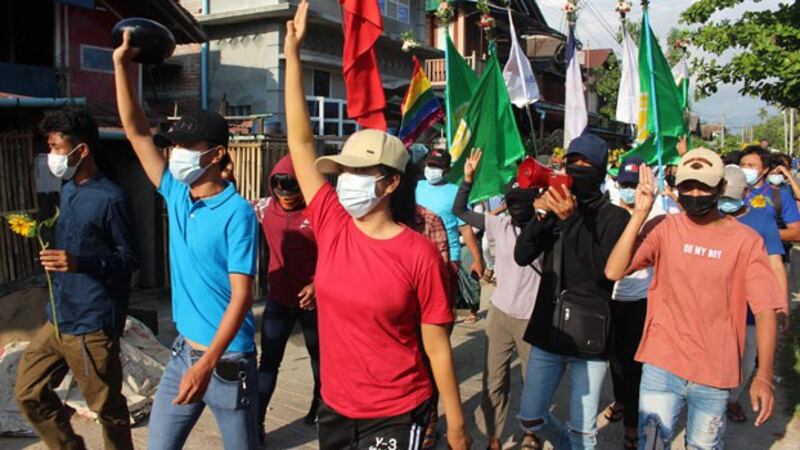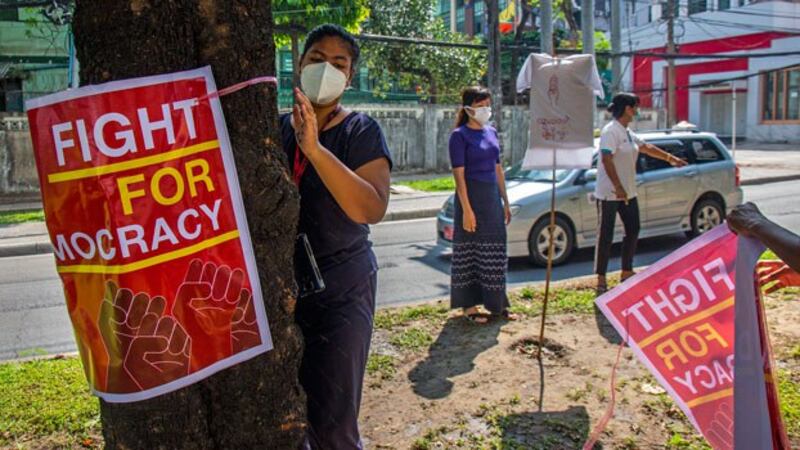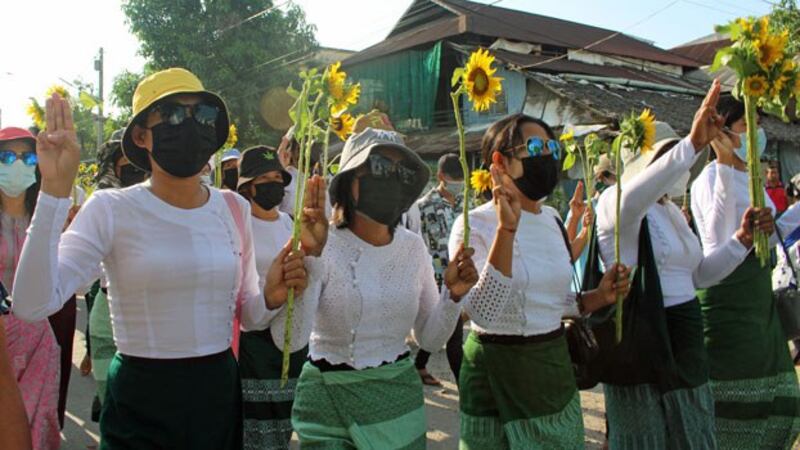Demonstrators in Myanmar on Wednesday launched a “blue shirt” campaign, honoring a late veteran dissident who always wore blue prison garb, to press their demand for the release of 3,300 protesters held by the military regime since the Feb. 1 coup deposed the elected government.
April 21 is the seventh anniversary of the death of Win Tin, a veteran journalist and a leading figure in the National League for Democracy (NLD), who was arrested in 1989 for joining protests against the previous junta government, a movement that launched the political career of Aung San Suu Kyi.
Released in 2008 after serving nearly 20 years in Yangon’s notorious Insein Prison, Win Tin wore a blue a prisoner’s shirt every day until his death to demand the release of all political prisoners in Myanmar, a former British colony that has been under military rule for two-thirds of its 73 years as an independent state.
“The current situation sees the entire country revolting against the junta,” said Zeyar Lwin, a member of the Peacock Generation satirical theater troupe jailed in 2019 for defaming the Myanmar Army in street performances.
“It is now more than two months and going on three months during which a lot of people have been arrested, and many have died,” he said. “For them, this is another type of movement for their liberation.”
“All the people, together with the young people, are now moving forward steadily to fight the military council and its allies,” Zeyar Lwin said, referring to the State Administrative Council, the formal name of the junta government.
The blue shirt protest — the latest in a series of symbolic shows of resistance to the 11-week-old junta — came a week after protesters in multiple cities in the country of 54 million people painted streets and buildings red in what they called a “Blood Campaign Against Dictatorship.”
Previous demonstrations have featured auspicious numbers, flowers, and shoes — all aimed at galvanizing protesters and honoring the more than 700 people killed since the Feb. 1 military coup deposed leader Aung San Su Kyi’s civilian government.

Blue shirts in Monywa
In Monywa, the largest city in northwestern Myanmar’s Sagaing region, a young protester said demonstrators are marching in blue shirts to press their demand for the release of local protest leader Wai Moe Naing, who was arrested last week after security forces rammed his motorcycle.
Security forces detained Wai Moe Naing and took him to a military base after a rally in Monywa on April 15. Photos of his beaten and bruised face went viral and stoked popular anger.
“People are writing the name of Wai Moe Naing on the palms of their hands,” the young protester said. “Our boycott committee will work for the release of all those who have been wrongfully arrested.”
The junta’s crackdown on protesters has displaced close to a quarter of a million people, according to Tom Andrews, the U.N.’s special rapporteur on human rights in Myanmar.
“Horrified to learn that in addition to murdering at least 737 people & arresting well over 3,200, the junta’s attacks have already left nearly a quarter million Myanmar people displaced, according to sources,” he tweeted. “The world must act immediately to address this humanitarian catastrophe.”
At least 10 people were killed Wednesday evening when junta forces open fired on local residents in Sagaing region, witnesses said. The gunfire began when local residents stopped about 200 military troops who had raided nearby villages after security forces scanned the crowd with drones.
“After completing an aerial survey by drones, they shelled the area seven times,” said one witness who did not give his name. “People scattered here and there for cover, and the troops came in.”
RFA was unable to reach junta spokesman Maj. Gen. Zaw Min Tun for comment.

Driving away evil forces
Residents of Mandalay and other cities and towns across Myanmar continue to bang pots and pans every day at 8 p.m. as a ritual to drive away the military, which they consider to be evil forces.
Police arrested a man banging pots on the veranda of his house in Chanayethazan township Wednesday night. He was released Thursday morning after he signed a document pledging not to repeat the action, said a person close to the man’s family.
Security forces targeting people ages 18 to 30 arrested more than 80 youths between Apr. 17 and 19 without presenting evidence of wrongdoing, protesters in various cities said.
Soldiers and police frequently check public transportation routes and make young men remove their shirts to look for tattoos supporting Aung San Suu Kyi or the Spring Revolution, as the protest movement is known locally, they said.
Residents also said they believe that the arrests are being made to stop young men from joining a proposed federal army to rise up against the military regime.
“If they want to get protesters they should be making the arrests during the protests,” a local woman said. “But now, it’s not even safe to walk on the streets.”
“They check everyone on the streets looking for weapons and other things,” she said. “They are intimidating people who are afraid of being killed.”
Police and soldiers also arrested 14 protesters following a march in Yangon’s Insein township, she added.

Arrests following bomb blasts
In Yankin township outside Yangon, security forces arrested more than 30 youths on Apr. 17 on suspicion of involvement in three bomb explosions at the General Administration Office that killed a police officer and injured three others, residents said.
“There have been reports of youths forming a resistance,” a young woman who regularly participates in protests in Yangon told RFA. She said young people in Ayeyarwady region created a group called the Ayeyarwady Federal Army.
“There are similar groups in several townships,” she added. “Maybe that’s why they are targeting young people.”
A dozen young people and bystanders were taken into custody Monday during a crackdown on a protest in Mandalay region’s Nyaung-U township, according to a resident.
The National Unity Government (NUG), a parallel government comprised of democratically elected officials and lawmakers and launched on April 16, has discussed forming a defense force to fight the military — a move that some ethnic armed groups said they would support.
The Assistance Association for Political Prisoners (AAPP), a Thailand-based rights group, said as of Wednesday that 739 people had been killed in violent crackdowns, while 3,331 others were being detained.
Reported by RFA’s Myanmar Service. Translated by Khin Maung Nyane. Written in English by Roseanne Gerin.
